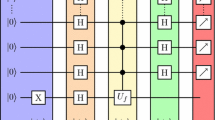Abstract
Two processors jointly provide a real-time service which can be completed by exactly one processor. Assuming each processor is allowed to announce only a one-bit information in a distributed way to decide which one should process the job, inevitably some of the jobs will get lost if only classical resources are used. In this paper, we proposed the distributed quantum entanglement sharing (DQES) model to share quantum entanglement with processors. Assisted with DQES model, not only the system dependability can be enhanced, but the faulty processor can also be identified. We also presented some possible applications such like database consistency, job scheduling, system dependability, and reliable communication protocols.











Similar content being viewed by others
References
Ambainis A, Schulman LJ, Ta-Shma A, Vazirani U, Wigderson A (1998) The quantum communication complexity of sampling. In: Proceedings of the 39th annual symposium on foundations of computer science, pp 342–351
Bennett C, Brassard G, Crepeau C, Jozsa R, Peres A, Wootters W (1993) Teleporting an unknown quantum state via dual classical and EPR channels. Phys Rev Lett 70:1895–1899
Brassard G (2003) Quantum communication complexity. Found Phys 33:1593–1616
Buhrman H, Cleve R, Wigderson A (1998) Quantum vs. classical communication and computation. In: Proceedings of the 30th annual ACM symposium on theory of computing, pp 63–68
Buhrman H, van Dam W, Hoyer P, Tapp A (1999) Muliparty quantum communication complexity. Phys Rev A 60:2737–2741
Buhrman H, Cleve R, van Dam W (2001) Quantum entanglement and communication complexity. SIAM J Comput 30:1829–1841
Chou Y, Tsai I, Kuo S (2006) Enhancing dependability through quantum entanglement in a real-time distributed system. In: Sixth IEEE conference on nanotechnology
Chou Y, Tsai I, Fahn C, Horng S, Kuo S (2007) Dependabilities in a high-performance quantum real-time distributed system. In: International conference on information technology
Cleve R, Buhrman H (1997) Substituting quantum entanglement for communication. Phys Rev A 56:1201–1204
Horodecki R, Horodecki P, Horodecki M, Horodecki K (2009) Quantum entanglement. Rev Mod Phys 81:865–942
Hromkovic J (1997) Communication complexity and parallel computing. Springer, Berlin
Hsu C, Chen S (2010) A two-level scheduling strategy for optimising communications of data parallel programs in clusters. Int J Ad Hoc Ubiquitous Comput 6(4):263–269
Hsuan P, Dow C, Chen S, Hwang S, Chen S (2008) Design and implementation of IPv6-based anycast system for mobile ad-hoc networks. J Int Technol 9(3):245–256
Kushilevitz E, Nisan N (1997) Communication complexity. University Press, Cambridge
Lee W, Stolfo SJ, Mok KW, Kui W (1999) A data mining framework for building intrusion detection models. In: IEEE symposium on security and privacy
Partridge C, Mendez T, Milliken W (1993) Host anycasting service. Request for comments: 1546, Category: Informational, BBN, Network Working Group. http://www.ietf.org/rfc/rfc1546.txt
Raz R (1999) Exponential separation of quantum and classical communication complexity. In: Proceedings of the 31st annual ACM symposium on theory of computing, pp 358–367
Sedaghat N, Tabatabaee-Yazdi H, Akbarzadeh TM (2011) Pareto front based realistic soft real-time task scheduling with multi-objective genetic algorithm on arbitrary heterogeneous multiprocessor system. J Int Technol 12(1):85–93
Yao A (1979) Some complexity questions related to distributive computing. In: Proceedings of the 11-th annual ACM symposium on theory of computing
Author information
Authors and Affiliations
Corresponding author
Rights and permissions
About this article
Cite this article
Chen, CY., Chou, YH. & Chao, HC. Distributed quantum entanglement sharing model for high-performance real-time system. Soft Comput 16, 427–435 (2012). https://doi.org/10.1007/s00500-011-0727-y
Published:
Issue Date:
DOI: https://doi.org/10.1007/s00500-011-0727-y




